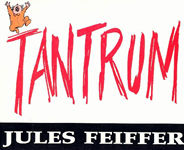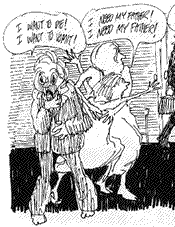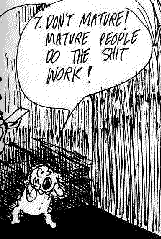
 Writer/Artist: Jules Feiffer
Writer/Artist: Jules Feiffer
Price: $16.95
Publisher: Fantagraphics Books
ISBN: 1-56097-282-3
It's curious to see how ignored Jules Feiffer has been within the comics industry. His name is hardly unknown, but the true range of his talent and versatility has been largely overlooked by both mainstream and comics press alike.
To many readers, he's simply "the guy who does that comic strip" (the eponymous FEIFFER), or, "that guy who illustrated THE PHANTOM TOLLBOOTH, right?"
Well, those may be two of his best-known works, but that assessment ignores quite a few of his other achievements.
It ignores his Pulitzer Prize for editorial cartooning, his award-winning plays (including LITTLE MURDERS), his Academy Award for his cartoon short MUNRO and his subsequent Best Screenplay nomination for the screenplay to CARNAL KNOWLEDGE.
It ignores his underrated work on the screenplay to Robert Altman's POPEYE (a fairly close retelling of the original E.C. Segar strips) and Alain Renais's I WANT TO GO HOME. It ignores the fact that he was Will Eisner's assistant for many years on THE SPIRIT and ghosted several of that strip's most memorable stories (including one selected by the Smithsonian Institute as a major example of "comic book comics").
It ignores his editing of the seminal anthology THE GREAT COMIC BOOK HEROES, which was one of the first major reprintings of classic comic work in a popular edition, and introduced an entire generation of writers and artists to the comics work of the 1940s.
And most shamefully, it ignores TANTRUM.
TANTRUM is a work largely ignored even within the Feiffer canon; even people familiar with his dramatic work or his cartooning work are mostly unaware of it. It was largely a curiosity when it was first published in 1980, and remained out of print until 1997, when Fantagraphics initiated an aborted mass-reprinting of Feiffer's work. It has been, for the most part, forgotten.
And yet, it remains an important work. Not only was it one of the earliest graphic novels, it's also one of the first true "widescreen" comics.
That, and it's still a damn good read.
 TANTRUM concerns Leo Quog, a 42-year-old corporate drone beset upon by the demands of his job, his family, and the unavoidable fact that most of his life has passed him by. "No give. No give. No give," he mutters on the opening page, and before we've reached Page 20, he's collapsed onto the floor in the titular tantrum and literally willed himself back to his two-year-old state.
TANTRUM concerns Leo Quog, a 42-year-old corporate drone beset upon by the demands of his job, his family, and the unavoidable fact that most of his life has passed him by. "No give. No give. No give," he mutters on the opening page, and before we've reached Page 20, he's collapsed onto the floor in the titular tantrum and literally willed himself back to his two-year-old state.
Very few people notice, actually.
His wife is annoyed and his children are numb with horror at the prospect of not having their father to cling to. Leo just wants what any two-year-old wants: A hot bath and a piggy-back ride.
Unable to find this at home, Leo sets off on a bizarre John Cheever-on-angel-dust odyssey involving his parents, his brothers his sisters, his wife, an army of other middle-aged-men turned infants, infants on their way to being middle-aged-men, his diet-crazed sister-in-law who wants to diet down to "pure essence", and, ultimately, his place in the world.
TANTRUM plays like an extended version of the themes found in Feiffer's weekly strip. Like those cartoons, it's filled with characters who are adrift, compromised, confused and terminally self-absorbed. Feiffer is one of the best dialogue writers in comics, although 'dialogue' is something of an overstatement - his characters don't talk to each other so much as they talk at each other, pouring out their fears and neuroses for everyone to hear.
When they actually acknowledge each other's existence, the result is something like this:
(Leo's wife, Carol, has taken him to a lawyer)
CAROL: (To lawyer, re: Leo) He was generous to a fault, gave till it hurt, loved us to distraction. Not perfect, mind you, but...
LEO: (blowing raspberries) PHOOEY! BRRRP! CRAPOLAH!
LAWYER: Sir, I mind you to keep a civil tongue in your head.
LEO: I'm TWO! How can a two-year-old be responsible for alimony and child support?
LAWYER: The disability you allege is irrelevant to your wife's legal status, little boy.
As clever as the dialogue is, though, what's particularly interesting about TANTRUM is Feiffer's jagged, deceptively simplistic artwork. Feiffer had experimented with longer narratives in his collection PASSIONELLA AND OTHER STORIES, but here he uses the advantage of having a larger format to work with than his usual comic strip to its full effect, employing the format of "widescreen" comics nearly two decades before that term became commonplace.
 The book has the width of a children's picture book, and possesses about the same height. Each page is comprised of one large, wide image; in the few cases where there are multiple images, it's a repetition of the same action or scene.
The book has the width of a children's picture book, and possesses about the same height. Each page is comprised of one large, wide image; in the few cases where there are multiple images, it's a repetition of the same action or scene.
The images have a scribbly, frantic urgency to them; as Neil Gaiman says in his introduction to the 1997 edition, "Everyone, everything in TANTRUM is drawn, lettered at white-hot speed; one gets the impression of impatience with the world at the moment of creation - that it would have been hard for Feiffer to have done it any faster."
As a result, TANTRUM possesses a level of immediacy and urgency atypical for most comics; the "camera" is able to transition between crowded scenes with several characters to closer shots of two characters to extreme close-ups of the tantrum-throwing Leo, while keeping all the 'panels' at an equal size. Each 'shot' appears both spontaneous, yet carefully composed, and the result is one of the few truly cinematic experiences in comics.
Jules Feiffer has had over six decades of experience in comics, and is one of the most prolific, honoured and influential creators in the history of the medium. In an age where people are looking for works that are unique, edgy and groundbreaking, they would do well to look backward and rediscover the works of Jules Feiffer. TANTRUM, like most of his work, is cynical, neurotic and oddly unsettling. It's also hilarious, dead-on and occasionally poignant.
Like Feiffer himself, it deserves another look.

This article is Ideological Freeware. The author grants permission for its reproduction and redistribution by private individuals on condition that the author and source of the article are clearly shown, no charge is made, and the whole article is reproduced intact, including this notice.


